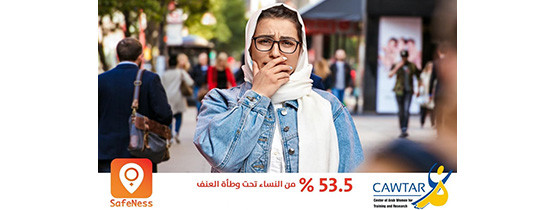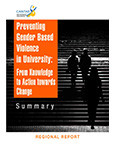Preventing Gender-Based Violence / GBV in Public / University Spaces: Building Evidence For Effective Solutions
Preventing GBV in the public / university space requires:
- Fill the gaps in knowledge and information necessary on GBV in public spaces,
- Contribute to changing policies and attitudes towards GBV in public spaces
- Carry out advocacy actions with a view to strengthening the level of awareness among the stakeholders concerned, rights holders and duty bearers.
Strengthen national and regional capacities in terms of methodology and innovative tools in action research in order to produce knowledge and data on GBV in public spaces, in general, and academia, in particular.

- Activity 1.1. Strengthen technical and institutional expertise in action research on GBV in public / university spaces, including sexual harassment.
- Activity 1.2: Conduct research on gender-based violence in public spaces
- Activity 1.3: Analysis and report writing on the results of research related to GBV in public spaces.
- Activity 1.4: Validate and disseminate the national reports and the regional synthesis report.
As part of this same specific objective (1) and given the spread of the covid-19 pondemic and the high rate of gender-based violence during confinement caused by the health crisis, the Arab Women's Center for training and research "CAWTAR" decided to conduct a rapid GBV assessment / survey with a focus on domestic violence before, during and after the closure period. The survey covers a sample of 1000 (women, government institutions and associations) in 7 Arab countries: Algeria, Egypt, Jordan, Lebanon, Morocco, Palestine and Tunisia. CAWTAR provided its partners with knowledge on the effects of gender-based violence on women during the closure due to COVID-19 targeting women, NGOs concerned with gender-based violence, shelters ... and providers of GBV services. And women's mechanisms, ministries of health and all other stakeholders.
In addition to the results of this survey and their analysis, the final report will also consist of a relevant desk review of the situation of gender-based violence in the target countries in addition to including all publications, (research, background documents). policy, briefing notes ...) during the closing period to address issues of violence.
CAWTAR has adopted a participatory approach since the launch of the project, through:
- Selection of researchers
- Organization of introductory / virtual consultative meetings with experts, universities, associations and ministries, to ensure consensus on the methodology and objectives of the study.
- Involve partner associations in the implementation of fieldwork by distributing and filling in questionnaires
Creation of an electronic platform on GBV to broaden the scope of sharing knowledge and experiences.

- Activity. 2.1. Develop and set up an electronic platform for sharing knowledge on GBV;
- Activity. 2.2. ensure the hosting, administration and maintenance of the platform
- Activity 2.3. Develop / implement social media tools and communication strategy with relevant tools.
- Activity 2.4. Strengthen the capacities of the network of observers set up.
- Activity 2.5. The “CAWTAR” Center, together with a group of young men and women, has developed a mobile phone application, “SafeNes”, which is an application running on the Android and iOS system that enables women and girls who use smart phones to protect themselves from violence and sexual harassment in public places in particular.
- Activity 2.6. The center modernized and updated the system of support for the rights of women and children thanks to information technologies "WRCATI" in Tunisia by adding and simplifying the law n ° 58 to fight against violence against of Women and Girls in Tunisia, which was adopted in 2017.
Facilitate change and the development of new areas of policy dialogue, in order to fight GBV in public spaces through advocacy interventions based on scientific evidence.

- Activity. 3.1: Prepare evidence-based awareness and advocacy campaigns at national and regional levels (materials, guidelines).
- Activity. 3.2. Build the capacities of pressure groups on political dialogue and advocacy towards behavior change and the adoption of relevant measures.
- Activité. 3.3. Organiser des actions stratégiques de sensibilisation en soutien aux campagnes de plaidoyer
- Activity. 3.3. Organize strategic awareness-raising actions in support of advocacy campaigns Activity. 3.4. Implement and evaluate evidence-based advocacy campaigns
An Action Research entitled: "Prevention of Gender-Based Violence in Public Spaces, especially in Universities: Building Evidence for Effective Solutions", carried out in 2018-2019, with professors, students, administrative and staff managers of both sexes, at Universities in Morocco and Tunisia
Preventing gender based violence in public spaces: from knowledge…

Preventing gender based violence in public spaces: from knowledge…
